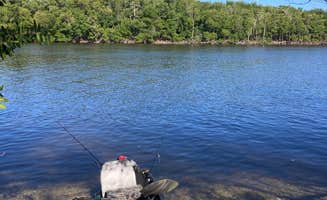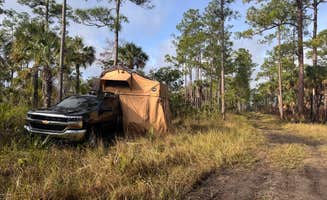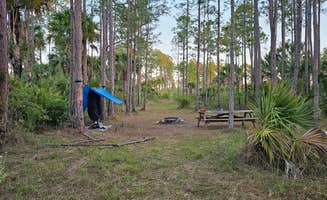Dispersed camping near Marco Island, Florida requires significant preparation due to the remote wetland environments of the Everglades and Big Cypress ecosystems. The subtropical climate creates distinct camping seasons, with winter (November-April) offering more comfortable temperatures and fewer insects. Summer months bring heavy rainfall, high humidity, and mosquito populations that can overwhelm unprepared campers. Water levels fluctuate seasonally throughout these areas, affecting trail conditions and campsite accessibility.
What to do
Paddle to platforms: Access Backcountry Crooked Creek Chickee by boat only as part of the Wilderness Waterway. According to a camper, "This chickee was just as described. I will warn all that this can be a tough adventure if paddling. Make sure you go with the tide, it was moving 3-4 during my paddle." The chickee consists of two bookable sites on a single platform.
Wildlife observation: The wetland ecosystems support diverse wildlife viewing opportunities. At Panther Camp, campers report seeing alligators, wading birds, and occasional signs of the elusive Florida panther. One camper noted the camp has "a water hole in the back of the camp which can be filtered. However a gator generally lives there. Better to pack your water in."
Night sky viewing: The remote primitive campsites offer minimal light pollution for stargazing. The winter dry season provides clearer skies and lower humidity for optimal viewing conditions. Bring red-light headlamps to maintain night vision while moving around camp.
What campers like
Fishing opportunities: The Everglades waterways provide excellent fishing directly from some campsites. One reviewer at Crooked Creek Chickee shared: "Fishing is epic, even from the chickee. Stay quiet and look under the platform, tarpon, snook and drum were always around."
Solitude and disconnection: The primitive nature of sites like Nobles Primitive Camp offers true wilderness experience. A camper described it as a "Great remote drive out to the primitive site" with "old florida" characteristics. The isolation provides opportunities for disconnecting from daily routines.
Cost-free camping: Most rustic camping near Marco Island, Florida requires permits but no fees. According to a visitor at Panther Camp, "There is no cost to stay, no reservations needed. You can fill out a permit from the website. However I have never been asked for it."
What you should know
Permit requirements: Most backcountry sites require permits obtained through Everglades National Park or Big Cypress National Preserve websites or visitor centers. While enforcement varies by location and season, permits help park services track usage and provide safety information.
Seasonal considerations: The dry winter season (November-April) offers most comfortable camping conditions. Summer brings frequent afternoon thunderstorms, higher water levels, and intense insect pressure. One camper noted at Ivy Primitive Camp that trail conditions can become extremely muddy during wet seasons.
Water filtration: Natural water sources require thorough filtration and treatment. Most campers recommend bringing all drinking water rather than relying on local sources. A Panther Camp visitor advised: "Better to pack your water in. Strong cell signal due to cell towers at the rest stop."
Tips for camping with families
Choose accessible sites: For family rustic camping near Marco Island, select sites with vehicle access when possible. Nobles Camp can be reached by unpaved roads, with one visitor noting, "Luckily the access road was drivable with two wheel drive."
Pack insect protection: Comprehensive insect protection is essential, especially during transition hours. According to a Crooked Creek Chickee camper, "Bugs were tough sunset and sunrise." Bring child-safe repellents, head nets, and full-coverage clothing for evenings.
Plan shorter stays: First-time family primitive camping trips benefit from shorter durations to test comfort levels. The remote nature and lack of facilities at Carpenter Primitive Camp and similar sites can challenge unprepared families with children.
Tips from RVers
Limited true RV options: Primitive sites in this region do not accommodate recreational vehicles. RVers seeking rustic experiences should consider nearby developed campgrounds like Collier-Seminole State Park as base camps for day excursions.
Day-use alternative: RV travelers can park at designated trailheads to access day hiking opportunities within Big Cypress Preserve, then return to established campgrounds with hookups for overnight stays. The primitive camping areas are primarily designed for tent and hammock camping only.




